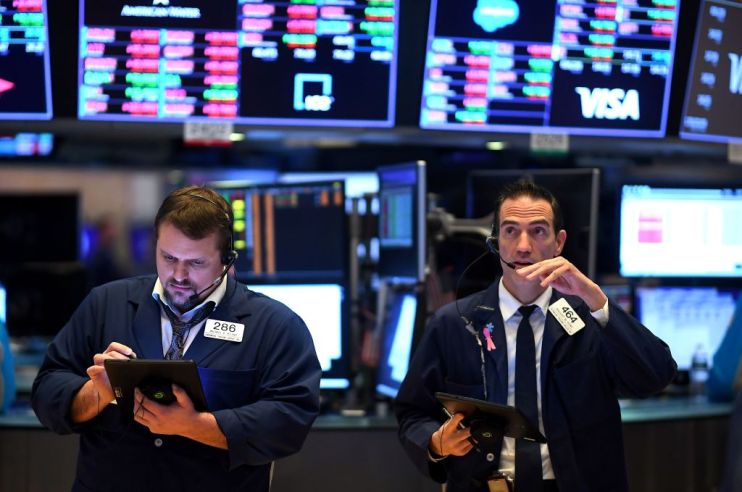US tech stocks plunge as FTSE 100 drops on no-deal Brexit fears

Wall Street opened lower while the FTSE 100 fell back into the red this afternoon as a US tech sell-off and Brexit fears rattled markets.
Downward pressure on the pound, as well as a strong set of corporate results, had initially boosted London’s premier index, but by the mid-morning the 0.5 per cent increase had been reversed.
London’s main index fell 0.9 per cent to 5,885 points in afternoon trading. The FTSE 250 also dropped more than one per cent.
Wall Street also started in the red, with the S&P 500 and Dow Jones trading 1.9 per cent and 1.7 per cent lower respectively.
But the slide was mainly driven by the tech-heavy Nasdaq, which tumbled more than three per cent as the sell-off of tech stocks continued.
Despite the fall, the FTSE was still ahead of Germany’s Dax, which dropped 0.6 per cent, with trade figures released today pointing to a slow recovery. The continent-wide Stoxx 600 also fell 0.9 per cent.
In Asia overnight, China’s CSI 300 climbed 0.5 per cent. Hong Kong’s Hang Seng gained 0.3 per cent and Japan’s Nikkei 225 rose 0.8 per cent.
Global stocks fell sharply last week, with investors questioning whether they had a “correction” on their hands after the shock rally of recent months.
Wall Street rattled by tech sell-off
This afternoon’s downbeat trading compounded losses on Wall Street last week as investors fled from tech stocks.
Apple, Microsoft, Facebook and Zoom were among the major tech players to suffer as investors shifted cash to safe havens.
It comes after a disastrous session on Thursday, when a tech sell-off sparked the worst day of trading on Wall Street for two months.
Shares made a modest recovery on Friday but still closed in the red, while markets were closed yesterday for Labor Day.
“The US is returning after the long bank holiday weekend to a lively session on Tuesday, with tech stocks once again leading the way lower and braced for more turbulence,” said Craig Erlam, senior market analyst at Oanda Europe.
“The recovery late Friday may have been short-lived, with the sector coming under heavy pressure across Europe and the big US names that have propelled US indices back into record territory coming in for a difficult session.
“Of course, put in perspective, most of these stocks haven’t even hit one month lows yet so there’s arguably plenty of room below.”
It was also a sobering start to the day’s trading for Tesla, which plunged more than 18 per cent.
In addition to the wider tech sell-off, Elon Musk’s company has been hit after it missed out on being included in the S&P 500 last week.
“Since the $70 lows in March, the shares have run higher hitting a peak of $502 last week, in anticipation of inclusion into the prestigious US benchmark,” said Michael Hewson, chief market analyst at CMC Markets.
“Friday’s decision not to include the company in the index could see further losses as investors take profits on their long positions.”
Brexit fears threaten battered FTSE 100
The FTSE 100 fell last week, but it recovered some of its lost ground to rise around 2.3 per cent yesterday.
However, despite a bright start, helped by a sharp drop in the pound of roughly 0.6 per cent, stocks changed direction.
That was driven by Brexit worries after a report said the UK government plans to override key elements of the withdrawal agreement struck with the EU.
The development came as the UK began a fresh round of trade talks by setting a 15 October deadline for a deal to be completed.
Prime Minister Boris Johnson said that there was “no point” thinking about timelines beyond that date.
“If we can’t agree by then, then I do not see that there will be a free trade agreement between us, and we should both accept that and move on”, he said.
At first, the slump was held off by a tumble in the value of the pound.
“Sterling slumped against other major currencies yesterday as the spectre of a no-deal Brexit returned to markets,” said Jim Reid of Deutsche Bank
Talks resume today, and the pound is under pressure again. It shed 0.2 per cent in early trading to stand at $1.314.
A falling pound helps the FTSE 100, however. It makes the overseas earnings of the index’s firms worth more.
Fiona Cincotta, market analyst at City Index, said: “Sentiment looks set to remain steady for now, although the real test will be when US cash markets open after the long weekend.”